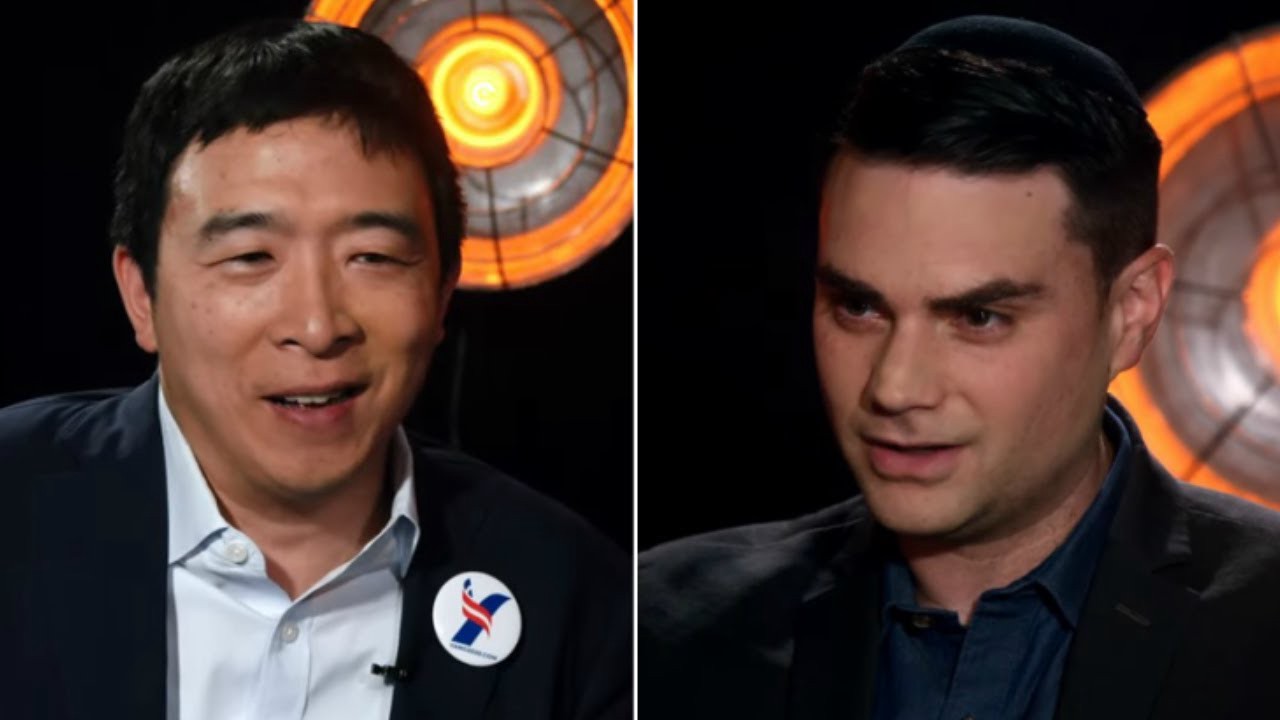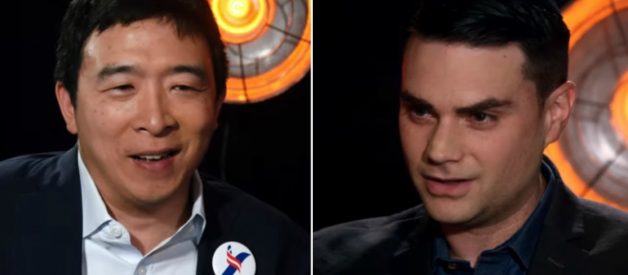 Andrew Yang (Left) and Shapiro (Right)
Andrew Yang (Left) and Shapiro (Right)
Last week, Andrew Yang, a Democratic candidate for the 2020 election sat down to discuss some of his ideas on the Conservative podcast ?The Ben Shapiro Show? hosted by Ben Shapiro, a conservative author, speaker and political commentator. Andrew Yang is best known as an entrepreneur, philanthropist and founder of ?Venture For America,? a non-for-profit which provides entrepreneurial support & career assistance to college graduates. Recently, however, Yang has been receiving most of his fame from announcing his candidacy in the 2020 US election.
Yang?s primary campaign talking point is his rendition of Universal Basic Income (UBI), which he calls a ?Freedom Dividend? that comes in the form of $1000 per month to each citizen rain, hail or shine.
The discussion came with great excitement to me, as someone who has increasingly heard Yang?s name peppered throughout the internet, with little actual understanding of how his ?Freedom Dividend? would work.
I was specifically excited that sat opposite Yang was Ben Shapiro.
Known for his skills in articulation and debating, Ben Shapiro made his breakout into popular culture because of a fiery debate he had on Gun Control with Piers Morgan.
The two intellectuals served as a Yin and Yang, (literally, in this case) as they both possess quick wit and intellect and yet both fall on opposite ends on the political spectrum.
I was in for a true interrogation of ideas.
Firstly, having watched the episode and taken notes, I thought I would summarize Yang?s notion of UBI as best I can, before providing some of Shapiro?s critiques.
What is Universal Basic Income?
Andrew Yang?s version of Universal Basic Income is entitled the ?Freedom Dividend,? which is a $1000 payment to each citizen of the US each month. The dividend is necessitated by what Yang perceives as the burgeoning ?Fourth Industrial Revolution? which will be caused by the automation of jobs as well as the increasing development of Artificial Intelligence. Yang believes that due to this technological shift in the workplace, there will be mass unemployment on a scale larger than any seen historically.
Jobs such as retail work and truck driving are some of the most prominent cases where Automation could displace workers, with truck driving being the most common job in 29 states, employing 3 and a half million people in the US.
With the advancement of self-driving cars, a job such as Truck Driving may find itself becoming obsolete, leaving millions out of a career.
Yang goes onto to remark that those who are unemployed and lacking skills tend to fall into substance abuse, depression, welfare dependency and suicide.
To avoid this worsening with job automation, Yang believes this ?Freedom Dividend? will give workers the safety net to shift into a different industry and remain employed, as well as give others the financial freedom to pursue undervalued careers and activities such as arts and volunteering.
For those who are on disability care or receiving welfare already, they will have a choice between remaining on their current welfare or taking the Freedom Dividend.
So now that I?ve laid out the basics of Yang?s rendition of UBI, I thought I would lay out some of Shapiro?s main questions surrounding the policy.
1. Where does the money come from?
The money would come from a Value-Added Tax system, or VAT, where companies would pay a tax on the profits made along each step of the production line. Yang gives the example of Amazon, who currently pays no tax in the US, despite dominated a huge chunk of the market share. Yang believes Amazon is an example of a missed opportunity for wealth redistribution.
2. How much will it cost?
The proposed dividend is estimated to cost 1.3 trillion, which Ben expresses understandable concern for. But rather than simply adding to the current welfare costs, Yang mentions that the Freedom Dividend would substitute a lot of those programs, with an increase in the workforce participation from those who are currently on disability related welfare. I?ll explain that a bit later.
Yang also goes on to cite Alaska, where each citizen of the State gets between $1000?2000 each year no questions asked as a dividend, which has brought in thousands of jobs and increased the well-being of individuals. He then goes on to mention that while welfare dependency is indeed increasing which will only increase with this upcoming technological revolution.
Rather than deal with the negatives of the revolution when they arise, Yang states that the Dividend would soften the blow, while still requiring people to work as the annual $12,000 from the dividend is below the US poverty line of $12,700.
Yang estimates the Freedom Dividend will yield a return of 2 million jobs in the long run due to increased purchasing power and disposable income for many citizens.
3. Why does the government need to assist with the displacement of jobs? We?ve seen with previous industrial revolutions that people got back on their feet, why can?t they now?
Well, according to Yang this wasn?t exactly the case. The first Industrial Revolution resulted in tumult, riots and protests. Of the 4 million displaced in the first Industrial Revolution, half of them never re-entered the workforce, with a further half of that group filing for disability. Many also became dependent on substances and increased in suicide and depression.
The upcoming ?Fourth Industrial Revolution? is projected to be three-to-four times larger than the prior industrial revolutions, which is concerning according to Yang because new jobs rarely mimic old jobs. They will require different skills and in different places. Given the magnitude of the displacement, Yang believes there will be many who fall through the cracks.
4. Don?t welfare programs lead people to complacency? If there were less welfare, wouldn?t people be forced to seek out work or move to higher-employment areas?
Yang responds that in some cases, people have their entire extended family in one city, and are sometimes dependent on their extended family for support. For those people to leave will mean leaving the only people they can depend on.
With the Freedom Dividend people will have the opportunity for increased mobility without the bureaucracy surrounding welfare.
An example of this bureaucracy is Disability welfare. For those on Disability, they receive funds on the premise that they are unable to work a suitable number of hours to make a living.
I know this is true from personal experience, having worked with a man who had a walking impediment. Despite our job requiring very little movement, he was unable to work the maximum hours as it would mean he would no longer receive disability support and would end up earning less money than he does currently.
To an extent, there is a financial incentive for some on welfare to minimise the work they do.
The difference with the Freedom Dividend is that it is ?no questions asked? and so individuals will have the choice between their current welfare and $1000. Yang believes that many will opt for the $1000 and increase their workforce participation.
5. Couldn?t your view of the upcoming tech-pocalypse cause people to lose motivation?
At this point Yang perhaps unknowingly uses Shapiro?s own catchphrase against him at this stage, which is ?Facts don?t care about your feelings.? While it wasn?t verbatim, Yang essentially says that ?whether or not it?s depressing, displacement is coming, and I believe the truth will galvanize people rather than freeze them into place.?
Andrew Yang makes a valid point. I don?t think sugar coating the reality of the situation will benefit people, if anything the illusion of normality will lead people to become complacent.
6. Do you believe that work is vital, or that people if given the chance will opt out of working?
Yang responds by saying he believes working is a great source of meaning for a lot of people. He also cites that this is a position backed up by the data, which is the negative behaviors exhibited by unemployed individuals such as a tendency towards depression, drug addiction and video games.
Yang believes that his Freedom Dividend will create 2 million new jobs due to the increase in buying power invested into local businesses and communities. He goes on to mention that there are many jobs that are undervalued such as arts, volunteering, community programs, motherhood, etc. which will also thrive if people have more disposable income.
7. You mention the lack of taxes paid by Amazon, but what about the jobs and goods they provide? Haven?t they vastly improved our lives?
Yang makes the point that while cheap consumer goods are fantastic, the effect of not having a job versus not having these cheap good is much worse. While our standard of living has indeed improved, those without a job fall into meaninglessness much quicker than those without a cheap toaster.
8. Doesn?t the free market highlight the value of human labor?
Yang responds that while the market may value Truck Driving at $50,000 per year, it could quickly shift to zero once the automation takes off. This could happen to a lot of professions that we can?t predict, and so the Freedom Dividend would buy time for individuals to rebuild their skill-sets around what the market values.
9. Doesn?t UBI assume that people will make good decisions with their money? We already see people on welfare buying the highest proportion of lottery tickets, what?s to suggest these same people wouldn?t just spend their Freedom Dividend on such frivolous goods?
Yang concedes this is a likelihood for some, but also remarks that living in poorer conditions tend to make poorer decisions simply because of the ongoing stress they face. With the Dividend these same people may have some stress alleviated to make better decisions.
10. Do you think this free money will add value to people?s lives?
No, Yang believes the money will create the conditions for people to improve their own lives where otherwise they may be trapped in an area or profession without the financial stability to pursue what they deem as meaningful.
Conclusion
In summary, the debate was refreshing and enlightening. Though I can?t help but feel saddened at the rarity of such a cordial, informed discussion. As Shapiro remarks, Yang is the only Democrat to have gone on his show. This debate was a revival of a polite, and yet disagreeable discourse not recently seen on the political field.
I was immediately impressed with how on-the-ball Yang was. Yang seemed to be able to volley every question lobbed at him by Shapiro, which is a skill few possess.
There were many points where I was on team Shapiro, as well as many moments where I wanted to join the #Yanggang.
Firstly, I agree with Yang that Amazon should be paying taxes and they are absorbing an increasing share of the job market. The upcoming displacement of jobs caused by automation is a big issue that needs addressing as there will be a large chunk of the workforce left unemployed and unskilled.
I also agree that more expendable income may give people the financial freedom to shift industries toward something they find more meaningful.
However, there is much I agree with Shapiro on. I appreciated that Shapiro emphasised the benefits brought by large corporations such as Amazon, which seems to be something progressive Democrats are unable to do. Rather than demonize wealth, we need to exalt entrepreneurs as they?re the ones providing jobs and the products which improve our lives.
I am also skeptical with regards to the increased volunteering and investment into jobs that are currently being undervalued. I would agree with Yang that the dividend is good for stay at home mothers, as that is a crucial job that can?t be monetized by the market.
However, with regards to artistic fields, the economy is doing well now and yet we?re still seeing the demolition of Journalism and other artistic endeavors.
I am inclined to be rather laissez-faire when it comes to the market, as value truly is what people are willing to pay. If people aren?t currently willing to spend a few dollars to read an article, then that article isn?t worth a few dollars. Perhaps more disposable income will change this, but it?s not guaranteed.
I?m also uncertain that the Dividend will bring the 2 million jobs that Yang believes it will. As Shapiro correctly stated, there was little improvement in unemployment in Finland, where UBI was tested for two years.
It?s likely, as Yang concedes, that many people will simply invest their UBI back into large companies such as Amazon. I think the increasing monopolization of industries by these large corporations is an issue that went untouched by Yang, which makes starting a small business much harder.
And for someone who has driven trucks for say, 25 years, they may need several years to study or qualify themselves for a new profession, which is a time period that seems unaccounted for in Yang?s vision.
All in all, the Freedom Dividend is a progressive idea rooted largely in facts and reality and is a unique solution to an impending problem. I?m uncertain what other solutions are out there, and until I find them, I may have to join the #Yanggang


